A Conversation With Suzanne Brockmann
by Claire E. White
New York Times bestselling author Suzanne Brockmann, or Suz as she's known to her friends,
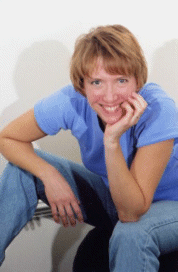
|
Suz has written in many romance genres, but is best known for her phenomenally popular "Troubleshooter, Inc." series about U.S. Navy SEAL Team Sixteen from Ballantine Books, and the "Tall, Dark & Dangerous" series about SEAL Team Ten from Mira Books. A prolific author of forty books to date, Suz has also written series romance for Silhouette Intimate Moments, Bantam Loveswept, Harlequin Intrigue, Precious Gems, Pinnacle and Meteor Kismet.
Suz's love of books and writing began at an early age. She started reading when she was three (she fondly remembers reading her first "real" book: Beverly Cleary's Here Comes the Bus). She began writing not long after that, penning a radio play called Mice on Mars, and a 200-page Star Trek novel when she was in high school.
After high school, Suz attended Boston University's School of Broadcasting and Film as a film major with a minor in creative writing. She never graduated, however, because she dropped out to sing lead in a rock and roll band. She also got married. She didn't start writing seriously until after her daughter Melanie and her son Jason were born. During what she calls her "learning years" she started writing screenplays and TV scripts, and also wrote a few more Star Trek novels. It wasn't until June 1992, that she set herself a very specific goal: to get published in genre fiction. To achieve that goal, she did a great deal of research and decided that she wanted to write romance novels. After reading widely in all the different romance genres, Suzanne sat down at the computer, and didn't get up for a year; she completed ten manuscripts during that year. The fourth book she wrote sold first (she later sold the second and third, as well) -- in December 1992, to Meteor's Kismet line. The book was called Future Perfect and was published in August, 1993. Since then, she's never looked back; her readership has grown with every book. Her stories are known for their vivid, multilayered characterizations, adrenaline-laced action, witty sense of humor and steamy sensuality. Her books often explore issues of identity and the masks that people wear to disguise themselves from the people around them. She is also known for tackling difficult subjects.
It's not often that readers will reach for a tissue when reading the dedication to a book, but many mothers have said they did just that when they read the dedication to Hot Target, Suz's latest hardcover release from Ballantine. Hot Target is an action-packed Navy SEAL adventure with a couple of very interesting twists. For one thing, the story is set in Hollywood, California, in the movie business. And, in a first for a major mainstream romance book, features a romantic subplot of openly gay FBI agent Jules Cassidy. Suz dedicated the book to her gay son Jason, and in that dedication she tells Jason's story in her trademark style: the story is heartwarming, passionate and very honest. Although the main romance couple is straight, Suz weaves in Jules' subplot (a popular recurring character in the series) seamlessly in a discreet manner that hasn't upset her more traditional fans.
Suz lives west of Boston with her attorney husband and her two children. When she's not writing, you might find her spending time with her family, working for her favorite charity, making music or traveling the country meeting her many fans. In this exclusive candid interview, Suz talks about her decision to go public with her son's story and the unexpected benefits that that Hot Target created for her and her family. She also gives us a behind the scenes look at how she creates her many fascinating characters.
What did you like to read when you were growing up?
Everything! If it had pages and told a story, fiction or nonfiction, I would read it. I particularly loved books that were part of an ongoing series -- no surprise there, since that's what I now like to write. I was a big fan of The Hardy Boys. I also loved the Chronicles of Narnia and LeGuin's Earthsea series. I've always been a big SF/Fantasy fan. Ever hear of a book called Mr. Bass's Planetoid? Yowza, was I ever thrilled to find out it was the first in a series!
When I was about eleven, I became a World War II history buff and read every single piece of World War II non-fiction on the shelves of my library. At about that same time, I discovered Alistair MacLean (author of Guns of Navarone, etc). I loved his suspense novels. Awesome stuff -- definitely an early influence. And I devoured P.G. Wodehouse and Donald Westlake, too. (I found them close to each other on the W shelf! What a treat!) Oh, yeah, and I also went through the library's entire collection of paperback westerns -- I read them because I liked the love stories!
I'd like to talk about your new release, Hot Target. The heroine is Mercedes Chadwick, a movie producer who presents a flamboyant and sexy face to the world, but who is really quite different in her private life. Mercedes has analyzed her industry and presents an image that she thinks the world wants to see, and it works for her. What was the greatest challenge in creating Mercedes?
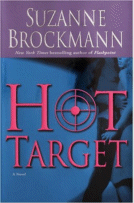
|
Cosmo Richter, the Navy SEAL who is hired to guard Mercedes couldn't be more different than Mercedes: he's the strong, silent type with hidden depths. What was your inspiration for Cosmo? (I love his relationship with his mom, by the way!)
A couple years ago the mother of a friend fell and broke both wrists. A few weeks later, an older friend of my mother's did the exact same thing. It completely immobilized both of these women, and I found myself thinking about how awful it must've been -- they had to have help doing EVERYthing. Jeez.
When it came time to write Cosmo's book, I'd already knew I wanted him to be very close to his mother -- because most folks don't look at a big, dangerous-looking, silent guy who hides behind mirror shades and wonder... about his relationship with his mother?! (Laughing)
It seemed natural that if Cosmo's mom broke both her wrists, he would make arrangements to stay stateside for a while -- to make sure she was taken care of. So that's why he's in California instead of off with SEAL Team Sixteen!
And as far as Cosmo goes -- I love using the "things are not as they seem" theme in my books. I think we all hide our true selves from the world -- and we're all looking for and hoping to find a relationship where we can open up and honestly be ourselves. You know, in many ways Cosmo and Jane are very much alike. They both go along with the public perception of who and what they are -- in fact, they use that misperception to their advantage -- Jane, by getting mileage as "the party girl producer," and Cosmo by getting mileage as a SEAL with a "dangerous" reputation. But really, they both want someone they can really talk to -- about things that matter to them.
| "You know, some kids do kill themselves rather than tell their parents that they're gay. When Jace and I were talking about that dedication and all the publicity I expected from this book, he said, 'If one person, just one person has an easier time coming out after reading about me, I will do a victory dance.' We've been doing a lot of dancing lately in our house." |
I agree -- gay characters in romance novels (along with TV shows and many contemporary movies) tend to be asexual. They come in, redecorate the heroine's house, say something witty and exit stage left.
Don't get me wrong -- I think it's great that gay characters are showing up in more and more books. This kind of diversity is a big step toward tolerance and acceptance.
But the truth is -- and I believe this completely -- that love is love is love. And people are people -- we all share more similarities than we do differences. In Hot Target, I wanted to show my readers that what Jules feels when he comes face to face with Adam isn't at all that different from what they might feel when confronted by an ex-lover.
Jules Cassidy has been an important secondary character in my books since The Defiant Hero -- which is the second book in the Troubleshooters series. He's played a part in just about every book up to Hot Target. After Gone Too Far came out (which was the story of Jules' best friend and FBI partner Alyssa Locke's romance with Navy SEAL Sam Starrett) I got tons of email from readers asking when was I going to give Jules a romantic subplot. My readers sure seemed ready to see significantly more of Jules and I was more than ready to take the plunge, so... I went for it! It was fun to write -- and I've gotten an incredibly positive response from most readers.
Jules Cassidy is not a stereotypical gay character; he's an FBI agent with a counter terrorism unit and a fully-realized character. What was the greatest challenge in creating Jules? How tricky were the love scenes for a gay character?

|
But would a real gay FBI be so open and out about his sexual orientation? Probably not. Although the world is changing, I bend reality a little bit there. In my fictional world, FBI agents don't have to hide in the closet. (Being in the closet is a terrible way to live, by the way.)
Creating Jules Cassidy as a character was pure joy. He was one of those characters who just immediately came to life and spoke to me. And I knew -- because he's so okay with who he is -- that he had a family who loved and supported him right from the start. I knew that he came out early in his life -- he didn't spend much time at all trying to hide his real self.
The trickiest thing for me about the gay love scenes is that there really weren't any in Hot Target. Yes, there are several kisses and they are steamy, but I made a very deliberate choice not to go any farther than that. I didn't want to go too far outside of my readers' comfort zones.
One step at a time, you know? I think this book opened up a lot of eyes and minds -- in terms of seeing a gay man as a complete person, as someone with a heart and soul, someone passionate and caring, someone who loves and who longs to be loved in return. As for the hot guy-on-guy sex, well, check back with me in a year or so, okay?
In terms of writing those kisses -- it wasn't any different than any other love scene I've ever written. It's all about who the character is, and what that character is feeling in that moment.
In the dedication to Hot Target you write to your son Jason, "One night, you took a deep breath and said to me, 'Mom, I think I'm gay.' 'I know that,' I told you, giving you a hug and a kiss. 'I love you I'll always love you. Where did you put your dirty socks?'" It's a moving and funny dedication: what prompted you to share such personal information with your readers? What does your son think about it?
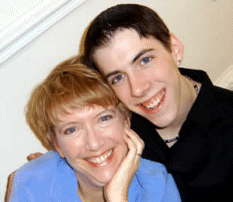 Suzanne Brockmann and her son Jason. |
See, my son Jason's been out since he was fifteen, but there's a huge difference between being out to friends and family and being Out with a capital O -- the way Ellen Degeneres and Mary Cheney are Out. We talked about that quite a bit -- I asked Jason if he would prefer that I not mention in any publicity that I'm a PFLAG mom, that I have a gay son, etc. and he looked at me as if I were crazy. (Laughing)
He told me that America really needs its gay citizens to come out. America needs their straight allies, their families and friends, to come out, too -- to speak up and say, "I'm proud of my gay son." "I support my gay sister." That's an important step towards gaining acceptance. (He really is quite a remarkable young man!!!)
| "The best advice I can give is to tell parents to really listen to your children. If your kids are frequently 'sick,' and really don't want to go to school -- don't brush it off. Kids who are suspected of being gay are sometimes threatened with physical violence from other intolerant students. But the parents are usually the last to hear of this -- what kid is going to run to mom or dad and say, 'Today I got pushed around in the cafeteria by these nasty guys who called me homo and faggot?' |
I told him I wanted to include his story in Hot Target because it would show the world that coming out doesn't have to be a painful, frightening event. It doesn't have to involve yelling and tears and kids getting kicked out of their homes.
I also wanted to tell his story, because I really did suspect that he was gay back when he was tiny. His being gay is not a choice -- in the same way that my daughter didn't choose to be left-handed. They were both simply born that way.
But most of all, I wanted to include it because it was my way of showing support for him and the entire gay community. Now I am Out, too, and I stand proudly beside Jason, shoulder to shoulder, a straight ally to his commitment to be true to himself.
You know, for some of my readers, Jules was their first openly out gay friend. But now, because I shared Jason's story, they know my son, too. And that's how tolerance grows -- by replacing ignorance and fear about a misunderstood group with introductions to individuals with names and faces. Also, like I said before -- for me, it's all about how similar we all are. And there's nothing more universal than a mother's love for her child! And I have to tell you, the email I've been getting from readers has just been extraordinary.
Lots of personal stories -- one of the most remarkable ones was from a reader I've known for a while. Nice lady. Quiet. Very kind. Very smart. (Like most of my readers!) Into raising money for good causes -- that's how we met. After reading Hot Target, she wrote and told me her brother came out when he was 20 -- after trying to kill himself. Her parents kicked him out -- and she, at 17 years old, went with him, in support. God bless her. What an amazing story.
And I just got an email a few days ago from a reader who showed the dedication in Hot Target to a friend who suspected his son was gay. Within a week after having the book in their house, his son came out. And his father's reaction was "I love you, unconditionally." Both Jason and I got misty-eyed when we read that email. You know, some kids do kill themselves rather than tell their parents that they're gay. When Jace and I were talking about that dedication and all the publicity I expected from this book, he said, "If one person, just one person has an easier time coming out after reading about me, I will do a victory dance."
We've been doing a lot of dancing lately in our house.
As the straight mother of a gay son, what has been the most difficult challenge you've faced so far? What advice would you have for a mother who has a feeling that her child might be gay and is worried about non-tolerant attitudes at school and in after-school activities?
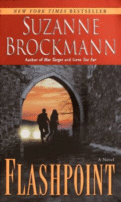
|
The only way to combat that is by education. By speaking up and saying, "Hey, my son is gay and not only am I okay with that, but I'm really proud of him."
As far as intolerance at schools... Did you know that the average high school student hears 25.5 gay slurs in the course of one single school day? (That's a statistic I took from the PFLAG website. PFLAG ("Parents, Families and Friends of Lesbians and Gays") has a safe schools program designed to make people aware of the struggles of gay youth in our society. It's an important program -- I'm going to be working with the Greater Boston Area PFLAG chapter in their fundraising efforts. We're going to raffle off a chance to appear as a secondary character in one of my next books! Watch my website for details!)
Back when Jace was 14, we pulled him out of public school. Even without knowing the official statistics, even before he came out, I knew that he was getting negative messages by going to that school, and I didn't want him growing up believing that he was wrong or bad. (He's the nicest, sweetest kid...)
The best advice I can give is to tell parents to really listen to your children. If your kids are frequently "sick," and really don't want to go to school -- don't brush it off. Kids who are suspected of being gay are sometimes threatened with physical violence from other intolerant students. But the parents are usually the last to hear of this -- what kid is going to run to mom or dad and say, "Today I got pushed around in the cafeteria by these nasty guys who called me homo and faggot?"
That's so not going to happen.
So what can be done about this? Support Gay/Straight Alliances. Every high school (and middle school!) should have one. They do not promote homosexuality. They merely work to make school a safe place for all students by teaching tolerance. Support PFLAG. You don't have to have a gay family member to be a Straight Ally!
Another thing I really recommend is to try to make your child feel safe about coming out to you. PFLAG promotes National Coming Out Day as a day for parents to say to their kids, "Hey, you know what? If you told me you were gay, I would still love you."
Another more subtle way to do it is to say something like, "Hey, that Ellen Degeneres is really funny. Did you know that she's gay? I bet her mom is really proud of her..." Or, "I read this story about this kid who got kicked out of his house because he told his dad he was gay! That's terrible! We would never kick you out. We love you and your sister unconditionally." Get the message to your kids. Gay or straight, you love them.
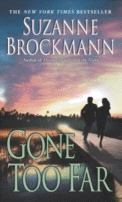
|
Oh, don't get me started!!! Four words: What would Jesus do? In my opinion, he'd be appalled by people who preach hatred and division in the name of God. Shame on Dr. Dobson. As for SpongeBob -- I'm a fan.
I'd like to talk about the details of writing. When you begin a new project, how detailed are your outlines? How much do you know about each of your characters before you start the book?
I'm a total outliner. I know exactly what's going to happen in each book before I start to write. I know my characters, too, inside and out. In my opinion, a writer really needs to know her characters in order for them to act and react consistently. See, writing is all about creating a situation and throwing your characters in and letting them react according to who they are and what they believe and value. Too many writers force their characters to do something, simply because the plot calls for it. That's a no-no. You've got to let your characters drive the plot, not the other way around!
Would you take us through a typical writing day for you? What are your surroundings? Do you listen to music when you write?
| "The only difference between a published and unpublished author is that the published author never quit. (Write that down and put it somewhere near your computer screen!)" |
I have an office with windows on three walls! I love sunshine, and I get a lot of it throughout the day! I stagger in some time in the morning, still wearing my PJs. (I'm a night owl and stay up very late. For example, as I'm writing this, it's 1:41 a.m. Yikes!) I have a coffeemaker right in my office and I get the coffee brewing while I read over yesterday's pages.
I have a daily deadline that I must meet -- a set number of pages. Usually around 5 to 7. (Right now, it's up to 9 or 10. I've got a deadline that's bearing down on me, fast...) So I start the day reading and revising yesterday's output, and by the time I finish that, I'm warned up and I just keep writing.
I'll stop for lunch, maybe wander down to my husband's Ed's office. We have two dogs -- miniature Schnauzers -- that we just adopted from a shelter last March. They adore Ed and sleep on his couch while he writes. (Ed's first legal thriller will be published at the end of May by Dell Books! Premeditated Murder by Ed Gaffney! Whoo-hoo!) I'll find my way downstairs a couple times a day to snuggle with the dogs. (And bug Ed!) (Laughing) When I'm under deadline, I try not to get online until the end of the day, but Ed or my personal assistant, Tina, will check my email -- make sure there's nothing urgent that I have to deal with. I'll write until I've reached my daily page count, or until the late-ish afternoon -- and then I'll take a break to workout on my Nordic Track. (I watch movies in 30 minute segments while I exercise!)
We'll often have friends over for dinner, then I'll go back to my office and finish up my pages, or sign online if I've already met my deadline. Or I'll do promotional work.
I do quite a bit of promotion -- I just spent a solid day working out the first draft of an itinerary for a west coast booksigning tour that will be attached to RWA's national conference in Reno, for example. I'll also do interviews like this one. About 9:30, I'll wander downstairs to watch a movie or TV show on DVD, or to see what Tivo's recorded for me! I'll sometimes end up back in my office after that, but I try not to. It's too easy to jump online "for just a minute..." and then, wham, it's 2 a.m.! (Laughing) I'll head off to bed somewhere between one and two, then get up in the morning and start over again!
Would you discuss your use of "Deep Point of View"?
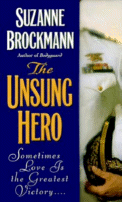
|
In my books, I use subjective point of view, but I'm not satisfied with merely showing the reader what that camera sees from its perch atop a character's head. I bring the camera down, inside of that character's head, so we see the world through that character's eyes. We hear things through his ears. We smell what he smells, feel what he feels, think what he think. With deep POV, I write using words that that character would use. I tell the story with that character's voice.
Deep POV is very similar to writing first person. (I, me, mine...) Except it's third person. (Sam's, He, him, his...) When I use deep POV (which is pretty much all the time!), I don't need to write "he thought," or "he felt" -- it's understood that the words I'm writing are this character's thoughts and feelings. This makes for tighter pacing and a livelier voice.
Keep in mind, however, that when I use deep point of view, I usually limit myself to one single point of view for each scene. If I want to move into someone's head, I have to have a scene break. I usually find it too jarring to headhop from one deep point of view to another to another.
If you want to learn how to write using deep POV, write a scene from the first person. Instead of using He or your character's name, use "I." Instead of his, use "my." And so on. Write as if you are your hero. Describe the world with his voice. Tell us what he feels -- or what he'll admit to himself that he's feeling!
What are some of your pet peeves in life?
Well, you touched on a few of 'em with that SpongeBob question! (Laughing) Intolerance makes me crazy. Ignorance does, too. I also get annoyed at people who bash the romance genre -- after reading only one romance novel. That's like watching one TV show and saying all television is crap. That's just silly.
Bullies really piss me off, too. Liars. Ooh, liars really raise my ire...
What is your advice to aspiring romance authors who have a manuscript and have done their homework, but who are feeling intimidated about their chances of ever getting published in today's competitive market?
| "Four words: What would Jesus do? In my opinion, he'd be appalled by people who preach hatred and division in the name of God." |
I have a half a dozen manuscripts that have never been published -- that will probably never be published. They were part of my learning process -- part of the journey I took to learn how to tell a story and to make characters come to life. If you don't sell your first book, don't give up! Nothing you do is a waste of time. Every time you sit down and write, you are moving forward. Write and write and write some more.
Keep on writing -- and set goals for yourself to become a better, stronger writer. Pledge to yourself that each book you write will be better than the last.
And never, ever give up!
**Photo of Suzanne and Jason by Eric Ruben.
Return to the February 2005 issue of The IWJ.
More from Writers Write
